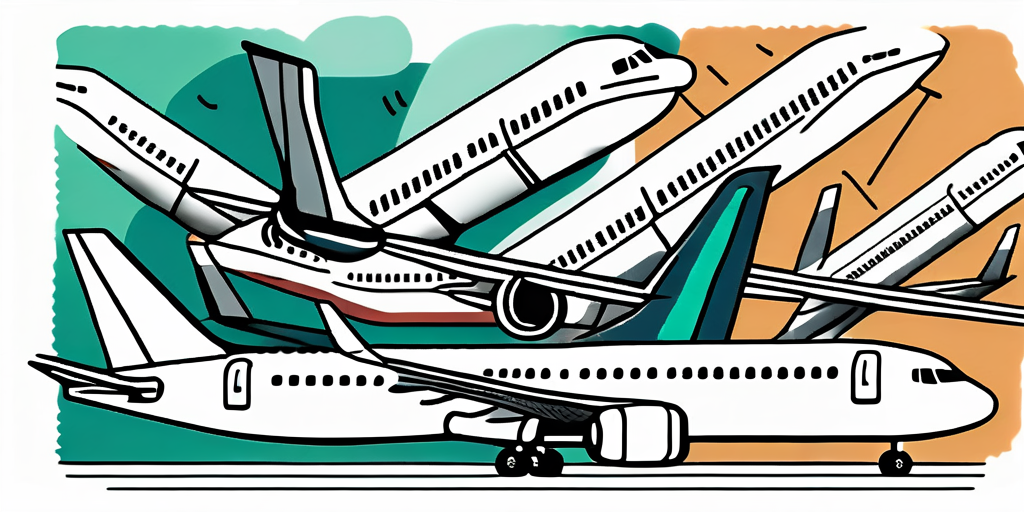Understanding Overbooking Compensation Regulations in the EU
Learn about your rights for overbooking compensation in the EU. Understand regulations and how to claim compensation for flight disruptions.
In recent years, overbooking has become a hot topic in the airline industry, leaving many passengers frustrated and seeking compensation for disrupted travel plans. To provide a clear understanding of overbooking compensation regulations in the European Union, we will explore the concept of overbooking, its impact on passengers, and the legal framework that governs it.
The Concept of Overbooking in the Airline Industry
Overbooking refers to the practice of airlines selling more tickets for a flight than the available number of seats. Airlines use historical data and algorithms to predict the number of no-show passengers, allowing them to maximize their revenue by filling vacant seats. While overbooking can be financially advantageous for airlines, it inevitably leads to situations where the number of passengers exceeds the available seats.

Definition and Reasons for Overbooking
In simple terms, overbooking occurs when an airline sells more tickets than there are available seats on a flight. This practice is motivated by factors such as unpredictable passenger no-shows, cancellations, and rebooking. Airlines strive to maintain high load factors to maximize profitability, and overbooking assists them in achieving this goal.
However, overbooking can create inconvenience for passengers, resulting in denied boarding, missed connections, or extended travel time. To mitigate these problems, airlines have a regulatory obligation to provide compensation and assistance to affected passengers.
The Impact of Overbooking on Passengers
When a flight is overbooked, passengers may experience significant disruptions to their travel plans. This can range from denied boarding to missed connections, long delays, or even having to find alternative flights at their own expense. Such situations can be not only stressful but also costly for passengers, who may incur additional accommodation, transportation, or meal expenses as a result of these disruptions.
Furthermore, overbooking can result in an unequal distribution of compensation, with some passengers receiving more than others due to factors such as ticket class, loyalty status, or negotiation skills. Such inconsistencies can lead to dissatisfaction among passengers and highlight the need for clear compensation regulations.
It is important to note that overbooking is a complex issue that requires a delicate balance between maximizing revenue for airlines and ensuring a positive travel experience for passengers. Airlines must carefully manage their overbooking practices to minimize the negative impact on passengers while still maximizing their operational efficiency.
In recent years, advancements in technology have played a significant role in helping airlines refine their overbooking strategies. Sophisticated algorithms and predictive models have allowed airlines to better forecast passenger behavior and adjust their overbooking practices accordingly. This has helped reduce the number of instances where passengers are inconvenienced due to overbooking.
Additionally, airlines have implemented various measures to mitigate the impact of overbooking on passengers. These measures include offering voluntary compensation to passengers willing to give up their seats, providing alternative flights or accommodations, and improving communication with affected passengers to keep them informed about the situation.
Despite these efforts, overbooking remains a contentious issue in the airline industry. Passengers continue to voice their concerns about the potential disruptions and inconveniences caused by overbooking, while airlines strive to strike a balance between maximizing their revenue and providing a satisfactory travel experience.
The Legal Framework for Overbooking in the EU
Recognizing the need for passenger protection, the European Union has established specific regulations to govern overbooking compensation. The primary legislation is EU Regulation 261/2004, which provides a comprehensive framework for passenger rights in the event of flight disruptions, including overbooking.
 EU Regulation 261/2004, commonly referred to as the 'Flight Compensation Regulation,' sets out the rights of passengers when their flights are disrupted within the EU or on flights operated by EU airlines. It applies to all flights departing from EU member states, regardless of the airline's origin or destination.
EU Regulation 261/2004, commonly referred to as the 'Flight Compensation Regulation,' sets out the rights of passengers when their flights are disrupted within the EU or on flights operated by EU airlines. It applies to all flights departing from EU member states, regardless of the airline's origin or destination.
Under this regulation, passengers who are involuntarily denied boarding due to overbooking are entitled to compensation, rebooking, re-routing, or a refund of their ticket, along with additional support and assistance, depending on the circumstances.
Rights of Passengers under EU Law
In addition to compensation, the regulation stipulates that passengers affected by overbooking are entitled to various rights, including the right to care, the right to be informed, and the right to choose. The right to care encompasses provisions for meals, refreshments, hotel accommodations, transportation between the airport and the hotel, and communication means such as phone calls or emails. Airlines are required to ensure that passengers are well taken care of during the disruption, ensuring their comfort and well-being.
Furthermore, the right to be informed is crucial in ensuring transparency and clarity for passengers. Airlines are obligated to communicate the reasons for the disruption, available assistance, and compensation options. This ensures that passengers have a clear understanding of the situation and are able to make informed decisions regarding their travel plans.
Lastly, the right to choose empowers passengers to decide between rerouting, rebooking, or obtaining a refund. This flexibility allows passengers to choose the option that best suits their needs and preferences. Whether it's rearranging their travel plans or seeking a refund, passengers have the freedom to make decisions that align with their individual circumstances.
By enshrining these rights in EU law, the regulation aims to protect passengers and ensure that they are not left stranded or disadvantaged due to overbooking. It provides a strong legal framework that holds airlines accountable for their actions and ensures that passengers are adequately compensated and supported during flight disruptions.
Compensation for Overbooking in the EU
When it comes to compensation for overbooking, several factors come into play, such as the duration of flight disruptions and the distance of the journey. Understanding the criteria for eligibility and calculating the compensation amount are essential for passengers seeking recompense for the inconvenience caused by overbooking.
 Overbooking occurs when an airline sells more tickets for a flight than there are available seats, often as a strategy to compensate for no-show passengers. While overbooking can lead to denied boarding and flight disruptions, passengers are protected by regulations that entitle them to compensation.
Overbooking occurs when an airline sells more tickets for a flight than there are available seats, often as a strategy to compensate for no-show passengers. While overbooking can lead to denied boarding and flight disruptions, passengers are protected by regulations that entitle them to compensation.
Determining Eligibility for Compensation
To be eligible for compensation under EU law, passengers must meet specific criteria. Firstly, the flight must have been departing from an EU member state or arriving in an EU member state on an EU airline. Secondly, the passenger must have a valid ticket, confirmed reservation, and performed check-in on time. Lastly, passengers should not have voluntarily given up their seat during a denied boarding situation.
EU Regulation 261/2004 outlines the rights of passengers in cases of denied boarding, flight cancellations, and long delays. These rights are applicable to all passengers, regardless of their nationality, and aim to ensure a certain level of protection and compensation in situations where air travel does not go as planned.
Calculation of Compensation Amounts
Compensation amounts for overbooking are determined based on the distance of the flight and the duration of the delay caused by the overbooking. The regulation categorizes flights into three distance bands: short-haul (up to 1,500 kilometers), medium-haul (1,500 to 3,500 kilometers), and long-haul (over 3,500 kilometers). The compensation amounts vary for each band, with longer flights generally attracting higher compensation.
Passengers on short-haul flights experiencing a delay of more than three hours may be entitled to €250 in compensation, while those on medium-haul flights could receive up to €400. For long-haul flights with delays exceeding four hours, passengers may be eligible for compensation of €600 or more. These amounts are fixed by the regulation and are designed to provide a fair level of compensation based on the inconvenience caused to passengers.
Procedures for Claiming Overbooking Compensation
When facing overbooking and seeking compensation, passengers need to be aware of the necessary steps to ensure their claims are processed smoothly and efficiently.
Steps to Take When Overbooked
When denied boarding due to overbooking, passengers should first remain calm and approach the airline staff to understand the situation and their available options. It is essential to request a written confirmation of the denied boarding, along with information about potential compensation and assistance entitlements. Gathering evidence, such as photographs, witness statements, or documents related to additional expenses incurred, can strengthen the passenger's case.
Navigating the Claims Process
Filing a claim for overbooking compensation often requires a thorough understanding of the airline's procedures and the relevant regulations. Passengers should first contact the airline directly, following their formal complaint procedure. It is recommended to communicate in writing, providing all relevant details, including flight information, booking reference, boarding pass, and supporting documents.
If the airline fails to respond or denies the claim unjustifiably, passengers can escalate the matter by involving national enforcement bodies, alternative dispute resolution entities, or seek legal advice if necessary. Various online platforms and legal services specialized in flight compensation claims can assist passengers in navigating the claims process and maximizing their chances of success.
Future Developments in Overbooking Regulations
The overbooking compensation landscape is continuously evolving, with ongoing discussions and proposed changes to EU regulations that aim to enhance passenger protection.
Proposed Changes to EU Regulations
In response to certain shortcomings and evolving industry practices, proposals have been put forward to strengthen passenger rights in cases of overbooking. These include clearer guidelines on the eligibility criteria, increased compensation amounts, and improved enforcement mechanisms.
Additionally, there have been calls to harmonize overbooking compensation regulations at the international level, creating a more consistent framework for passengers regardless of their destination or airline choice.
Impact of Brexit on Overbooking Compensation
With the United Kingdom's exit from the European Union, there have been concerns surrounding the continuity of overbooking compensation regulations. However, it is worth noting that existing EU regulations are implemented into national laws of EU member states, including the UK, ensuring that passenger rights remain protected, at least in the short term. The long-term impact of Brexit on overbooking compensation will largely depend on future agreements between the UK and the EU.
By understanding overbooking compensation regulations in the EU, passengers can assert their rights and seek proper compensation when their travel plans are disrupted. While overbooking may continue to present challenges for both airlines and passengers, a robust legal framework ensures that affected travelers receive the compensation and support they deserve.
Get the Compensation You Deserve with ClaimCompass
Don't let overbooking disrupt your travel without fair compensation. ClaimCompass is here to ensure that you receive up to 600€ for your travel inconveniences. Our expertise in EU Regulation 261/2004 and our commitment to air passenger rights empower us to handle your claim efficiently—from submission to potential court proceedings. Check your eligibility for free using our compensation calculator and let us take care of the rest. Remember, you pay nothing unless we succeed in claiming your compensation. Submit your claim with ClaimCompass today and secure the compensation you're entitled to.
